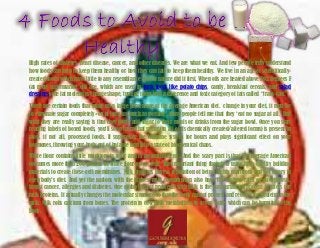
4 foods to avoid to be healthy
- 1. High rates of diabetes, heart disease, cancer, and other diseases. We are what we eat. And few people truly understand how foods can help to keep them healthy or how they can fail to keep them healthy. We live in an age of scientifically- created foods which have little to any resemblance of how nature did it first. When oils are heated above 392 degrees F (as most supermarket oils are, which are used in junk foods like potato chips, candy, breakfast cereals, and salad dressings) the fat molecules change shape, turning them into a difference and toxic category of fats called “trans-fats.” There are certain foods that make up a large percentage of the average American diet. change in your diet, it must be to eliminate sugar completely--or at least as much as possible. Many people tell me that they „eat no sugar at all.‟ But what they are really saying is that they don‟t add sugar to their meals or drinks from the sugar bowl. Once you start reading labels of boxed foods, you‟ll soon learn that sugar (in all of its chemically created/altered forms) is present in most, if not all, processed foods. It suppresses the immune system for hours and plays significant effect on your hormones, throwing your body out of balance and into a state of biochemical chaos. White flour contains little nutrition, is toxic and is an antinutrient . And the scary part is that the average American consumes more than 200 pounds of white flour every year! The important thing though is using high-quality building materials to create these cell membranes. Milk products have a reputation of being highly nutritious and necessary in everybody‟s diet. And yet the nations with the highest milk consumption also have the highest rates of osteoporosis, breast cancer, allergies and diabetes. One of the largest problems with milk is the pasteurization process: it alters the milk proteins. It actually changes the molecular structure so that the body cannot process and receive the protein in the milk. Milk robs calcium from bones. The protein in cow milk metabolizes to strong acids which can be harmful to the body.
